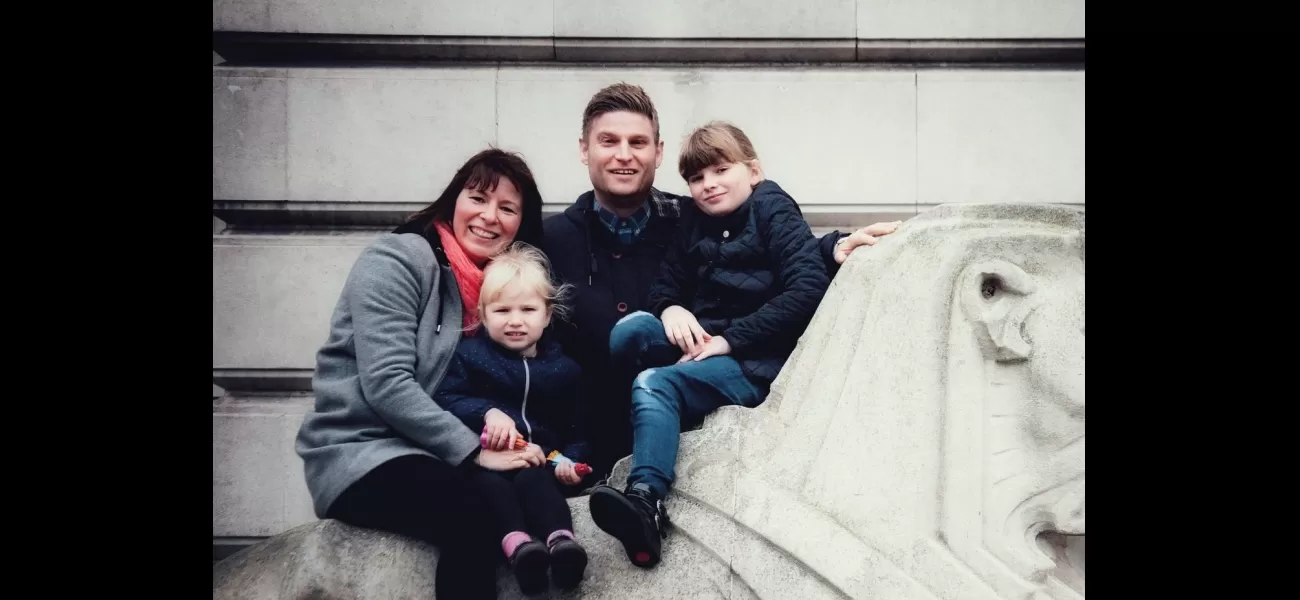An unusual ailment transformed my daughter into a real-life ‘Wolverine’.
The physician warned of dehydration, nausea, and excessive hair growth.
August 17th 2024.

Olivia, our first-born, was a beautiful baby. She was born in August 2010, after a perfect pregnancy and a quick, pain-free delivery. I remember being so overjoyed, especially because we didn't have to pay for parking at the hospital. But as any parent knows, the highs of parenthood can quickly turn into lows. It's like being tethered to a pendulum, never knowing when it will swing and catch you off guard.
One day, when Olivia was just 10 weeks old, she woke up from her nap looking different. Her breathing was shallow and her lips were turning blue. My wife Jemma noticed right away and picked her up, and thankfully, Olivia recovered. But then it happened again, just two days later. Being new parents, we didn't want to overreact, so we made an appointment with the doctor for the next day. I went to work, trying to stay calm and not worry too much.
But then, it happened again. This time, Jemma called an ambulance. When the paramedic arrived, he checked Olivia's blood sugar and told us it was 1.1, when it should be five. We didn't fully understand what this meant, but we knew it couldn't be good. Our baby was seriously ill.
As we sat in the ambulance, I couldn't help but blame my fellow comedian, Rob Beckett. I had shared Olivia's story with him during a car ride, and he was completely captivated. I later appeared on his Parenting Hell podcast to share the story again and the response from listeners was overwhelming. It felt like something that needed to be heard.
Looking back now, there were signs that something was wrong with Olivia. She slept a lot and didn't take her milk like other babies. Jemma struggled with feeling disconnected from her, while I had the energy of someone who just came back from a spa weekend. We didn't know it then, but a nightmare was waiting for us.
Doctors couldn't figure out what was wrong with Olivia. We spent weeks in the hospital, taking turns sleeping on a fold-out bed next to her cot. She underwent numerous tests and was force-fed high calorie milk to keep her blood sugar up. Finally, after 14 days, we were sent home with the reassurance that it was just a temporary issue. But it didn't feel like we could start our lives again. We now had a blood sugar machine, heel prickers, and an abundance of calorie feed at home. It was a constant reminder of the fear and uncertainty we had just experienced.
We were told to keep monitoring Olivia's blood sugar and that she would eventually grow out of it. But we couldn't shake off the anxiety and fear. We were afraid of our own baby. And then, two weeks later, it happened again. Olivia's blood sugar dropped and we were back in the hospital. This time, we were admitted to the oncology department, where we were surrounded by children who were very sick. We felt like imposters, not belonging in that space.
But then, a glimmer of hope appeared. A doctor overheard two nurses discussing Olivia and realized she might know what was wrong. Olivia had a rare genetic condition called congenital hyperinsulinism (CHI), which is essentially the opposite of diabetes. Her pancreas was producing too much insulin, causing her blood sugar to drop dangerously low. This condition affects only one in 40-50,000 babies and can be lethal. We finally had a diagnosis, but we were still stuck in the hospital, waiting for a solution.
As the days turned into weeks, we became somewhat institutionalized. We spent our time walking around the hospital, drinking too much coffee, trying to sleep in a noisy environment, and sneaking in some wine to cope with the stress. We were in a holding pattern, waiting for something to change. But finally, after three and a half months, we were able to bring Olivia home and start our lives again, this time with the added responsibility of managing her condition.
One August afternoon, our eldest daughter Olivia suddenly woke up from her nap looking very different. Her shallow breathing, blue lips, and glazed eyes were alarming. Even her body went limp, like a protester being arrested. At just 10 weeks old, my wife Jemma picked her up and she immediately recovered. But two days later, it happened again. Of course, we didn't want to be those overprotective new parents, so we made an appointment with the doctor for the next day and I went to work calmly.
But then, in the afternoon of that same day, it happened again. Olivia's eyes rolled back and she seemed lifeless. Jemma immediately called for an ambulance and the paramedic who arrived checked her blood sugar. He told us it was at 1.1, and it should be at least five. We both knew right then that something was seriously wrong with our baby.
I can't help but blame comedian Rob Beckett for what happened next. I first shared Olivia's story with him during a car ride after a gig and he was completely captivated. He even joked that he was literally trapped since the child locks were on. Later, I appeared on his podcast, Parenting Hell, with Josh Widdecombe, and the response from the listeners was overwhelming. I felt like Olivia's story had to be heard.
Looking back now, the signs were always there. Olivia was a perfect baby, with a perfect pregnancy and birth. She was even born in just 28 minutes, without any pain relief. I was overjoyed, not only because of our beautiful daughter, but also because we didn't have to pay for parking. But as any parent knows, it's like being on a rollercoaster - one moment you're filled with joy, the next you're hit with despair, and you never see it coming.
Olivia's symptoms were subtle at first, but looking back, they were always there. She slept a lot and wasn't interested in her milk. This was especially tough for Jemma, who felt like she wasn't able to bond with her daughter. It was awkward meeting up with other parents, seeing them exhausted and with eye bags, while we were full of energy like we had just come back from a spa weekend. Little did we know, a nightmare was about to begin.
Low blood sugar in babies can be normal, but Olivia's results were far from normal. Doctors couldn't figure out what was wrong with her. Our family and friends supported us by bringing us food, clothes, and company during our hospital stays.
Days turned into weeks as Olivia underwent every test imaginable. She had her heel pricked every hour, fluid was taken from her spine, and her urine and blood were constantly tested. She was even force-fed high calorie milk to keep her blood sugar up. After 14 days, we were sent home, confused and exhausted, but relieved that it seemed to be a temporary issue.
But it wasn't just us and our new baby at home anymore. We now had a blood sugar machine, heel prick devices, and gallons of calorie feed stacked up in our cupboards. Doctors told us to keep feeding and testing, assuring us that eventually her blood sugar levels would stabilize and she would outgrow this. We were happy to be home, but we couldn't relax. We were constantly on edge, afraid of what could happen to our baby.
Just when we thought things were getting better, they took a turn for the worse. Olivia's blood sugar dropped to 1.6 and we found ourselves back in the hospital. This time, we didn't leave for another three and a half months. We were admitted to the oncology department, which was a whole new level of seriousness. We were surrounded by very sick children and their worried parents. We felt like imposters, knowing that our daughter's condition wasn't as severe as the others.
But then, a miracle happened. A doctor overheard two nurses talking about Olivia and recognized her symptoms. She was an endocrine specialist and she was convinced she knew what was wrong. Olivia had a rare genetic condition called congenital hyperinsulinism (CHI). It's essentially the opposite of diabetes - the pancreas produces too much insulin, causing the blood sugar to drop dangerously low.
CHI affects one in 40-50,000 babies and can be life-threatening. In fact, it's often mistaken for sudden infant death syndrome (SIDS). With this condition, a child's blood sugar can drop suddenly and they can slip into a coma. It was a relief to finally have a diagnosis, but we were still stuck in the same routine, with days turning into weeks. We had become accustomed to the hospital life, walking around the halls, drinking endless cups of coffee, and trying to sleep in a noisy environment.
But finally, after months of uncertainty and fear, Olivia was able to come home. We were overjoyed to have her back, but things were different now. We had to constantly monitor her blood sugar, prick her heel multiple times a day, and give her high calorie feeds. It was a new normal for us, but we were just happy to have our daughter back in our arms.
One day, when Olivia was just 10 weeks old, she woke up from her nap looking different. Her breathing was shallow and her lips were turning blue. My wife Jemma noticed right away and picked her up, and thankfully, Olivia recovered. But then it happened again, just two days later. Being new parents, we didn't want to overreact, so we made an appointment with the doctor for the next day. I went to work, trying to stay calm and not worry too much.
But then, it happened again. This time, Jemma called an ambulance. When the paramedic arrived, he checked Olivia's blood sugar and told us it was 1.1, when it should be five. We didn't fully understand what this meant, but we knew it couldn't be good. Our baby was seriously ill.
As we sat in the ambulance, I couldn't help but blame my fellow comedian, Rob Beckett. I had shared Olivia's story with him during a car ride, and he was completely captivated. I later appeared on his Parenting Hell podcast to share the story again and the response from listeners was overwhelming. It felt like something that needed to be heard.
Looking back now, there were signs that something was wrong with Olivia. She slept a lot and didn't take her milk like other babies. Jemma struggled with feeling disconnected from her, while I had the energy of someone who just came back from a spa weekend. We didn't know it then, but a nightmare was waiting for us.
Doctors couldn't figure out what was wrong with Olivia. We spent weeks in the hospital, taking turns sleeping on a fold-out bed next to her cot. She underwent numerous tests and was force-fed high calorie milk to keep her blood sugar up. Finally, after 14 days, we were sent home with the reassurance that it was just a temporary issue. But it didn't feel like we could start our lives again. We now had a blood sugar machine, heel prickers, and an abundance of calorie feed at home. It was a constant reminder of the fear and uncertainty we had just experienced.
We were told to keep monitoring Olivia's blood sugar and that she would eventually grow out of it. But we couldn't shake off the anxiety and fear. We were afraid of our own baby. And then, two weeks later, it happened again. Olivia's blood sugar dropped and we were back in the hospital. This time, we were admitted to the oncology department, where we were surrounded by children who were very sick. We felt like imposters, not belonging in that space.
But then, a glimmer of hope appeared. A doctor overheard two nurses discussing Olivia and realized she might know what was wrong. Olivia had a rare genetic condition called congenital hyperinsulinism (CHI), which is essentially the opposite of diabetes. Her pancreas was producing too much insulin, causing her blood sugar to drop dangerously low. This condition affects only one in 40-50,000 babies and can be lethal. We finally had a diagnosis, but we were still stuck in the hospital, waiting for a solution.
As the days turned into weeks, we became somewhat institutionalized. We spent our time walking around the hospital, drinking too much coffee, trying to sleep in a noisy environment, and sneaking in some wine to cope with the stress. We were in a holding pattern, waiting for something to change. But finally, after three and a half months, we were able to bring Olivia home and start our lives again, this time with the added responsibility of managing her condition.
One August afternoon, our eldest daughter Olivia suddenly woke up from her nap looking very different. Her shallow breathing, blue lips, and glazed eyes were alarming. Even her body went limp, like a protester being arrested. At just 10 weeks old, my wife Jemma picked her up and she immediately recovered. But two days later, it happened again. Of course, we didn't want to be those overprotective new parents, so we made an appointment with the doctor for the next day and I went to work calmly.
But then, in the afternoon of that same day, it happened again. Olivia's eyes rolled back and she seemed lifeless. Jemma immediately called for an ambulance and the paramedic who arrived checked her blood sugar. He told us it was at 1.1, and it should be at least five. We both knew right then that something was seriously wrong with our baby.
I can't help but blame comedian Rob Beckett for what happened next. I first shared Olivia's story with him during a car ride after a gig and he was completely captivated. He even joked that he was literally trapped since the child locks were on. Later, I appeared on his podcast, Parenting Hell, with Josh Widdecombe, and the response from the listeners was overwhelming. I felt like Olivia's story had to be heard.
Looking back now, the signs were always there. Olivia was a perfect baby, with a perfect pregnancy and birth. She was even born in just 28 minutes, without any pain relief. I was overjoyed, not only because of our beautiful daughter, but also because we didn't have to pay for parking. But as any parent knows, it's like being on a rollercoaster - one moment you're filled with joy, the next you're hit with despair, and you never see it coming.
Olivia's symptoms were subtle at first, but looking back, they were always there. She slept a lot and wasn't interested in her milk. This was especially tough for Jemma, who felt like she wasn't able to bond with her daughter. It was awkward meeting up with other parents, seeing them exhausted and with eye bags, while we were full of energy like we had just come back from a spa weekend. Little did we know, a nightmare was about to begin.
Low blood sugar in babies can be normal, but Olivia's results were far from normal. Doctors couldn't figure out what was wrong with her. Our family and friends supported us by bringing us food, clothes, and company during our hospital stays.
Days turned into weeks as Olivia underwent every test imaginable. She had her heel pricked every hour, fluid was taken from her spine, and her urine and blood were constantly tested. She was even force-fed high calorie milk to keep her blood sugar up. After 14 days, we were sent home, confused and exhausted, but relieved that it seemed to be a temporary issue.
But it wasn't just us and our new baby at home anymore. We now had a blood sugar machine, heel prick devices, and gallons of calorie feed stacked up in our cupboards. Doctors told us to keep feeding and testing, assuring us that eventually her blood sugar levels would stabilize and she would outgrow this. We were happy to be home, but we couldn't relax. We were constantly on edge, afraid of what could happen to our baby.
Just when we thought things were getting better, they took a turn for the worse. Olivia's blood sugar dropped to 1.6 and we found ourselves back in the hospital. This time, we didn't leave for another three and a half months. We were admitted to the oncology department, which was a whole new level of seriousness. We were surrounded by very sick children and their worried parents. We felt like imposters, knowing that our daughter's condition wasn't as severe as the others.
But then, a miracle happened. A doctor overheard two nurses talking about Olivia and recognized her symptoms. She was an endocrine specialist and she was convinced she knew what was wrong. Olivia had a rare genetic condition called congenital hyperinsulinism (CHI). It's essentially the opposite of diabetes - the pancreas produces too much insulin, causing the blood sugar to drop dangerously low.
CHI affects one in 40-50,000 babies and can be life-threatening. In fact, it's often mistaken for sudden infant death syndrome (SIDS). With this condition, a child's blood sugar can drop suddenly and they can slip into a coma. It was a relief to finally have a diagnosis, but we were still stuck in the same routine, with days turning into weeks. We had become accustomed to the hospital life, walking around the halls, drinking endless cups of coffee, and trying to sleep in a noisy environment.
But finally, after months of uncertainty and fear, Olivia was able to come home. We were overjoyed to have her back, but things were different now. We had to constantly monitor her blood sugar, prick her heel multiple times a day, and give her high calorie feeds. It was a new normal for us, but we were just happy to have our daughter back in our arms.
[This article has been trending online recently and has been generated with AI. Your feed is customized.]
[Generative AI is experimental.]
0
0
Submit Comment





